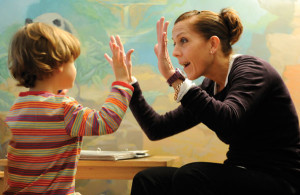 As far as fulfilling careers go, there few as demanding, challenging, and yet rewarding as that of a professional who works with children with special needs. Perhaps one of the most challenging segments of the population to be in the business of helping is autistic children, largely due to the fluctuation in severity of symptoms and the difficulty in diagnosing the disorder. Strides are being made every day, though, to advance our understanding of Autism Spectrum Disorders, which only helps to improve the effectiveness of those who have made a career out of helping these precious souls succeed.
As far as fulfilling careers go, there few as demanding, challenging, and yet rewarding as that of a professional who works with children with special needs. Perhaps one of the most challenging segments of the population to be in the business of helping is autistic children, largely due to the fluctuation in severity of symptoms and the difficulty in diagnosing the disorder. Strides are being made every day, though, to advance our understanding of Autism Spectrum Disorders, which only helps to improve the effectiveness of those who have made a career out of helping these precious souls succeed.
A recent Medical News Today article suggests that the ability to accurately identify the symptoms of autism is imperative for diagnosing Autism Spectrum Disorders at an earlier age. This is important not only for parents, but for professionals who have chosen a career in which they teach or otherwise help autistic children because the earlier a child is diagnosed, the sooner effective treatments and behavioral therapies can begin. The awareness of autism symptoms is an important focus of the month of April, Autism Awareness Month.
Early Diagnosis Is Helpful In Choosing Therapies
The sooner parents are aware of symptoms to watch for and the sooner a child is diagnosed when symptoms are displayed, professional therapists and special education teachers can begin to help the child to alter some behaviors. It all begins with awareness. Researchers at the University of Wisconsin-Madison have done extensive research in symptoms of and diagnosis of autism and have found a distinct correlation between the child’s display of symptoms and being able to diagnose the child with autism at an earlier age.
Research has shown that autism can be diagnosed as early as age two. However, many children are older than that when they are actually diagnosed. Some children are as old as eight years old before a correct diagnosis is determined. When all the symptoms of autism are present, many children can effectively be diagnosed around age three. When only some of the symptoms are present, however, diagnosis normally happens later.
Symptoms To Watch For When Attempting To Diagnose Autism
Autism specialists will tell you that symptoms range from person to person and the severity of symptoms can also vary. One main symptom used to diagnose an Autism Spectrum Disorder includes difficulty in communication, normally in non-verbal communication. There can be aversion to physical contact that most other children find to be pleasant, like withdrawal when a hug is given. Also, strict adherence to specific routines and becoming upset when routines are changed are common behaviors that are seen. Children with autism symptoms can also be startled and upset by bright lights, unusual smells and very loud noises.
Many children with autism also experience difficulty interacting with their peers, display inappropriate responses to other people, and suffer from speech difficulties and repetitive behavior. They seem to have difficulty in feeling empathy for other people’s feelings and often times they respond inappropriately to others because of this.
Two hallmarks of an autism spectrum disorder are that the child with autism experiences stages of development differently and at different rates than other children, and the way they learn can be erratic and random when compared to the way children without autism learn new things. This ranges from learning something extremely quickly and easily to forgetting something they’ve learned at a random moment. Individuals interested in a career in working with autistic children need to have empathy, patience and tenacity.
Making Life Better For Those With Autism And Their Families
Autism Speaks reports that the number of children diagnosed with an autism spectrum disorder has increased 10-fold in the last forty years. Severity of symptoms varies widely between children, making diagnosis tricky. One thing experts agree on, however, is that the sooner a child is diagnosed with an autism spectrum disorder, the sooner effective therapies and educational assistance can begin. This can make life better for the person with autism, the families caring for them, and the professionals who desire to help them grow into productive adults.
 Follow
Follow